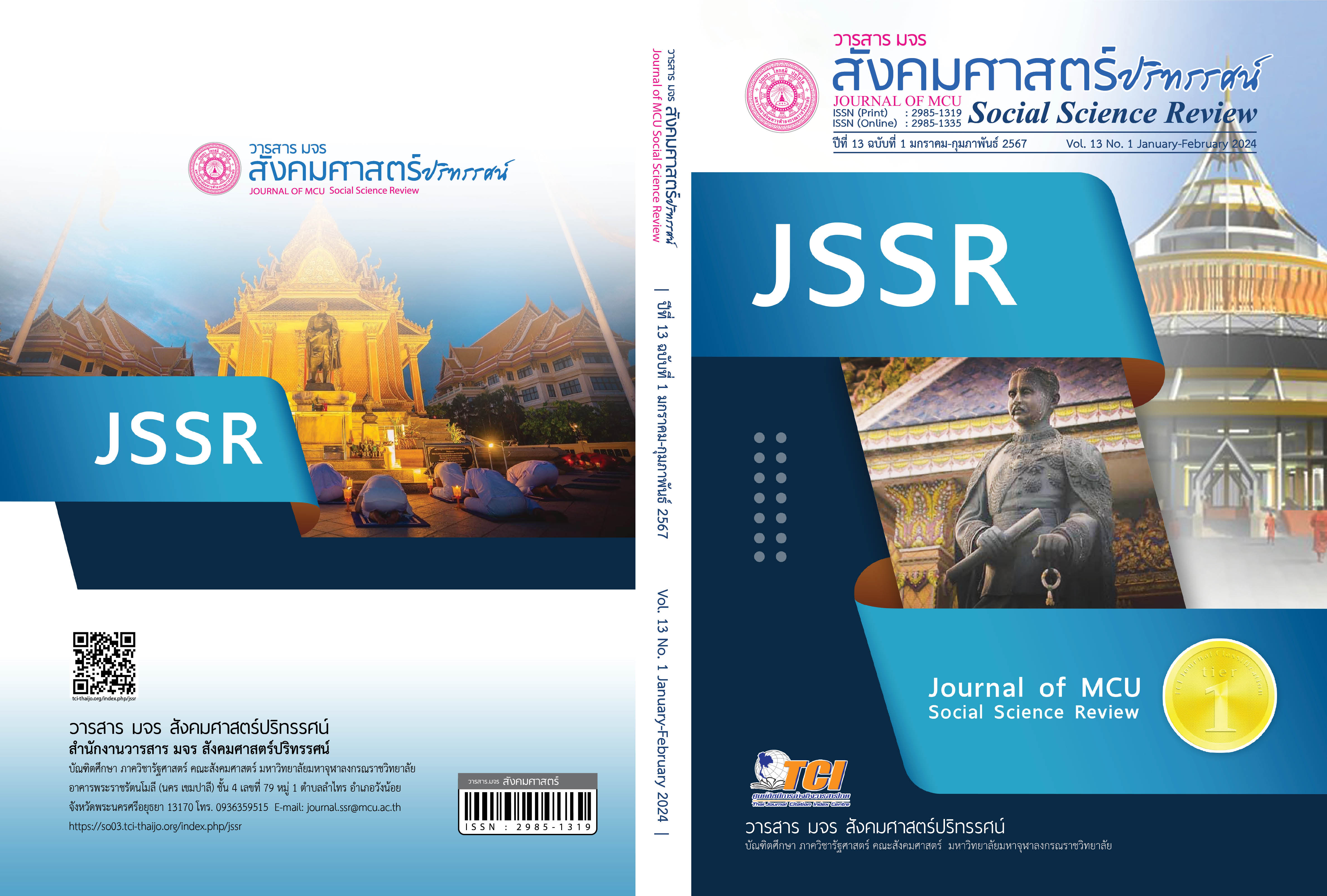การพัฒนารูปแบบความสัมพันธ์เชิงสาเหตุของปัจจัยที่มีอิทธิพลต่อภาวะผู้นำ การเปลี่ยนแปลงของหัวหน้ากลุ่มสาระการเรียนรู้โรงเรียนในสังกัด สำนักงานเขตพื้นที่การศึกษามัธยมศึกษาเขต 9
คำสำคัญ:
การพัฒนารูปแบบความสัมพันธ์เชิงสาเหตุ, ภาวะผู้นำการเปลี่ยนแปลง, โรงเรียนในสังกัดสำนักงานเขตพื้นที่การศึกษามัธยมศึกษาเขต 9บทคัดย่อ
บทความวิจัยนี้มีวัตถุประสงค์ 1. พัฒนารูปแบบความสัมพันธ์เชิงสาเหตุ
2. ตรวจสอบความตรงของรูปแบบความสัมพันธ์เชิงสาเหตุ 3. ศึกษาขนาดอิทธิพลของปัจจัยที่มีอิทธิพลต่อภาวะผู้นำการเปลี่ยนแปลงของหัวหน้ากลุ่มสาระการเรียนรู้ เป็นการวิจัยเชิงทดลองและพัฒนากลุ่มตัวอย่าง คือ หัวหน้ากลุ่มสาระการเรียนรู้โรงเรียนในสังกัดสำนักงานเขตพื้นที่การศึกษามัธยมศึกษาเขต 9 เครื่องมือที่ใช้ คือ แบบวัดเกี่ยวกับแรงจูงใจใฝ่สัมฤทธิ์ ความผูกพันต่อองค์การ เก็บข้อมูลโดยใช้แบบสอบถาม วิเคราะห์ข้อมูลโดยใช้โปรแกรมสำเร็จรูปทางสถิติ
ผลการวิจัยพบว่า 1. รูปแบบความสัมพันธ์เชิงสาเหตุ แสดงให้เห็นว่าตัวแปรการสนับสนุนทางสังคมมีอิทธิพลลบทางตรงและทางอ้อมต่อตัวแปรภาวะผู้นำการเปลี่ยนแปลงอย่างมีนัยสำคัญทางสถิติที่ .05 2. รูปแบบความสัมพันธ์เชิงสาเหตุ มีความสอดคล้องกลมกลืนกับข้อมูลเชิงประจักษ์ ตัวแปรในรูปแบบความสัมพันธ์เชิงสาเหตุอธิบายความแปรปรวนในตัวแปรภาวะผู้นำการเปลี่ยนแปลงได้ 3. การพิจารณาอิทธิพลของตัวแปรแฝงที่เป็นสาเหตุของตัวแปรภาวะผู้นำการเปลี่ยนแปลง มีดังนี้ 1) ตัวแปรความผูกพันต่อองค์การมีอิทธิพลทางตรง 2) ตัวแปรบุคลิกภาพมีอิทธิพลบวกทางตรง 3) ตัวแปรความฉลาดทางอารมณ์มีอิทธิพลลบทางตรง 4) ตัวแปรแรงจูงใจใฝ่สัมฤทธิ์มีอิทธิพลทางตรงและทางอ้อม 5) ตัวแปรการสนับสนุนทางสังคมมีอิทธิพลลบทางตรงและทางอ้อม ต่อตัวแปรภาวะผู้นำการเปลี่ยนแปลงอย่างมีนัยสำคัญทางสถิติที่ระดับ .05
เอกสารอ้างอิง
กรมสุขภาพจิต. (2543). อีคิว: ความฉลาดทางอารมณ์. นนทบุรี: สำนักพัฒนาสุขภาพจิตกรมสุขภาพจิต.
ชาคริต มานพ. (2550). การพัฒนาโมเดลเชิงสาเหตุของภาวะผู้นำการเปลี่ยนแปลงของนักเรียนเตรียมทหาร (วิทยานิพนธ์ครุศาสตรมหาบัณฑิต สาขาวิชาวิจัยการศึกษา). กรุงเทพฯ: จุฬาลงกรณ์มหาวิทยาลัย.
บุญชม ศรีสะอาด. (2545). การวิจัยเบื้องต้น (พิมพ์ครั้งที่ 8). กรุงเทพฯ: สุรีริยาสาส์น.
พระราชบัญญัติการศึกษาแห่งชาติ พ.ศ. 2542 และแก้ไขเพิ่มเติม (ฉบับที่2) พ.ศ. 2545 และ (ฉบับที่ 3) พ.ศ.2553. (2542, 19 สิงหาคม). ราชกิจจานุเบกษา. เล่ม 116 ตอนที่ 74 ก. หน้า 1.
สำนักงานคณะกรรมการพัฒนาเศรษฐกิจและสังคมแห่งชาติ. (2559). แผนพัฒนาเศรษฐกิจและสังคมแห่งชาติ ฉบับที่ 12 (พ.ศ. 2560-2564). กรุงเทพฯ: สำนักนายกรัฐมนตรี.
Barbuto, J. E., & Burbach, M. E. (2006). The emotional intelligence of transformational leaders: A field study. The Journal of Social Psychology, 146(1), 51-64.
Bass, B. M., & Avolio, B. J. (1994). Improving Organization Effectiveness Through Transformation Leadership. Thousand Oaks: Sage.
Bono, J. E., & Judge, T. A. (2004). Personality and Transformational and Transactional Leadership: A Meta-Analysis. Journal of Applied Psychology, 89, 901-910.
Costa, P. T. & McCrae, R. R. (1995). Revised NEO Personality Inventory (NEO-PI-R) and NEO Five-Factor Inventory (NEO-FFI). Florida: Psychological Assessment Resources.
House, J. S. (1981). Work Stress and Social Support. Reading, MA: Addison-Wesley. leadership. Journal of Management Development, 25(8), 777-794.
Leithwood, K. A., et al. (1999). Teacher burnout: A critical challenge for leaders of restructuring schools. NY, US: Cambridge University Press.
Liontos, L. (1992). Transformational Leadership in Eric Digest. Eugene Oregon: Eric Clearinghouse, University of Oregon.
Mitchell, D.E. & Tucker, S. (1992). Leadership as a way of thinking. Educational Leadership, 49, 30-35.
Sergiovanni, T. (1994). Building community in schools. San Francisco. CA: Jossey Bass.
Spence, J. T., & Helmreich, R. L. (1983). Achievement related motives and behavior. San Francisco: W.H. Freeman.
Steers, R. M. & Porter, L. W. (1983). Motivation and Work Behavior. McGraw-Hill: New York.
ดาวน์โหลด
เผยแพร่แล้ว
รูปแบบการอ้างอิง
ฉบับ
ประเภทบทความ
สัญญาอนุญาต
ลิขสิทธิ์ (c) 2024 วารสาร มจร สังคมศาสตร์ปริทรรศน์

อนุญาตภายใต้เงื่อนไข Creative Commons Attribution-NonCommercial-NoDerivatives 4.0 International License.
เพื่อให้เป็นไปตามกฎหมายลิขสิทธิ์ ผู้นิพนธ์ทุกท่านต้องลงลายมือชื่อในแบบฟอร์มใบมอบลิขสิทธิ์บทความให้แก่วารสารฯ พร้อมกับบทความต้นฉบับที่ได้แก้ไขครั้งสุดท้าย นอกจากนี้ ผู้นิพนธ์ทุกท่านต้องยืนยันว่าบทความต้นฉบับที่ส่งมาตีพิมพ์นั้น ได้ส่งมาตีพิมพ์เฉพาะในวารสาร มจร สังคมศาสตร์ปริทรรศน์ เพียงแห่งเดียวเท่านั้น หากมีการใช้ภาพหรือตารางหรือเนื้อหาอื่นๆ ของผู้นิพนธ์อื่นที่ปรากฏในสิ่งตีพิมพ์อื่นมาแล้ว ผู้นิพนธ์ต้องขออนุญาตเจ้าของลิขสิทธิ์ก่อน พร้อมทั้งแสดงหนังสือที่ได้รับการยินยอมต่อบรรณาธิการ ก่อนที่บทความจะได้รับการตีพิมพ์ หากไม่เป็นไปตามข้อกำหนดเบื้องต้น ทางวารสารจะถอดบทความของท่านออกโดยไม่มีข้อยกเว้นใดๆ ทั้งสิ้น





